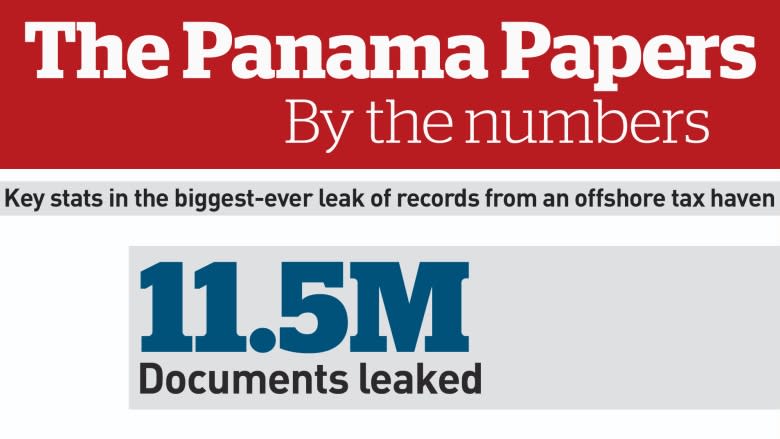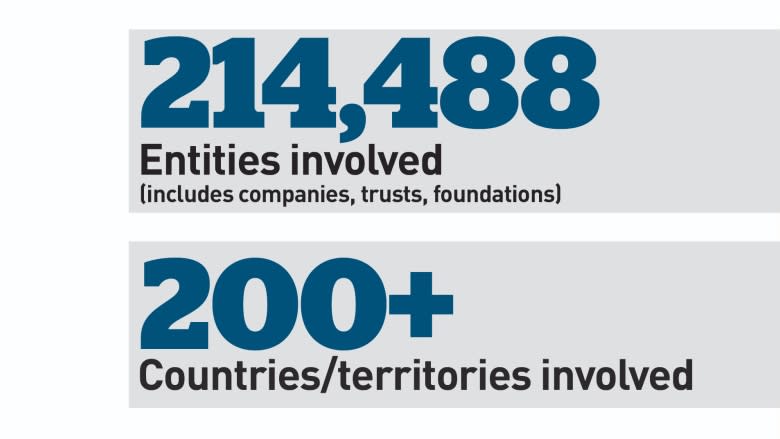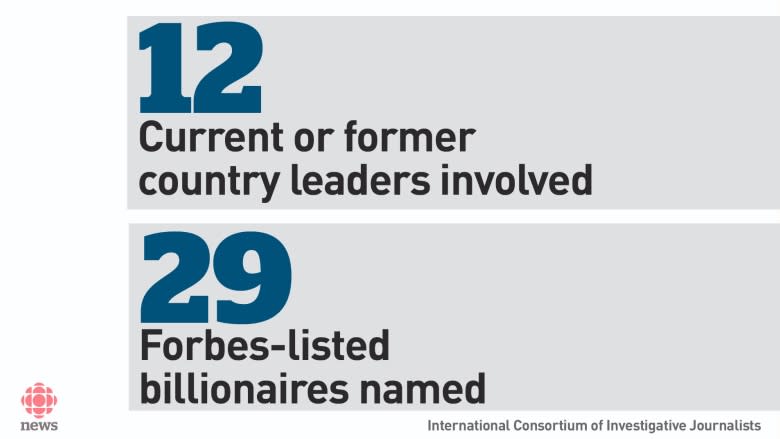Panama Papers: How the release of the documents could lead to deadly political purges
Embarrassment, prosecution, political instability and murder — all possible ramifications, say some observers, of the leak of millions of confidential documents revealing the hidden offshore assets of billionaires, top government officials, celebrities and athletes.
"I'd be stunned if insiders in the authoritarian governments that this has been leaked on are not caught up in purges and killed as a consequence of this information," said U.S. political scientist Ian Bremmer, head of the global political risk research firm Eurasia Group.
"Because when you're talking about stealing billions of dollars from the people and you're a dictator, that's the information that's most important to keep close at hand and that's what people are most willing to fight for."
The dump of 11.5 million documents that reveal offshore financial activity through the Panamanian law firm Mossack Fonseca includes the dealings of 12 current or former heads of state. Among the countries with past or present political figures named in the reports are Iceland, Ukraine, Argentina, Pakistan, Saudi Arabia, China and Russia.
Icelandic PM resigns
Icelandic Prime Minister Sigmundur David Gunnlaugsson, who, along with his wife controlled a secret offshore company in the British Virgin Islands, according to the leaked documents, stepped down on Tuesday after mounting public pressure.
The documents also reveal alleged links to family members and friends of former and current authoritarian leaders Syrian President Bashar al-Assad, Zimbabwean President Robert Mugabe, Pakistani Prime Minister Nawaz Sharif, former Libyan leader Moammar Gadhafi and ousted Egyptian president Hosni Mubarak.
"This is a threat to all of them," Bremmer said, referring to the authoritarian governments linked to the scandal. "It's the biggest threat to the ones who are the least popular, who have people waiting in the wings, who would love to see them fall.
"Everybody knows these guys have been enriching themselves, but you've never been able to shine a light on it."
Russian President Vladimir Putin's childhood friend Sergei Roldugin, a cellist, was listed as the owner of companies that obtained payments from other companies worth tens of millions of dollars.
"The insiders in Russia finding out this cellist was making a bunch of money but [now thinking], 'How come I wasn't?' — that has the potential to lead to significant infighting among the people who truly are powerful in these countries," Bremmer said.
A number of countries, including Canada, whose citizens were named in the documents, have already vowed to launch investigations.
"The minister of national revenue has instructed CRA officials to obtain the list of data leaked through Panama Papers in order to cross-reference this information with data already being obtained through the agency's existing mechanisms," the Canada Revenue Agency said in a statement.
But the success of those investigations will in part depend on how many resources each country has to devote to a probe.
"It depends on national tax regulators," said Crawford Spence, a professor of accounting at the Warwick Business School in London.
"You have a lot of individuals who are involved in these schemes who may have a lot of questions to answer to those particular agencies. Now that would be the main legal repercussions."
'Real problem pursuing all those people'
In Britain, for example, HM Revenue & Customs is chronically under-resourced, Spence said.
"They're going to have a real problem pursuing all those people."
One former official at the U.S. Department of Justice said this information leak is a "gold mine" in terms of leads. But the problem is that for a successful prosecution for some of these cases, much of the information resides in Panama.
"It's impossible to get information out of the law firm," the former official said. "We've tried for years."
Martin Kenney, a Canadian fraud and asset recovery lawyer based in the British Virgin Islands who leads a team of 30 investigators, said there will be repercussions from this document drop.
"On a scale of [serious consequences] from 0 to 10, and 1 and 2 is embarrassment, deep embarrassment to having to answer questions, a lot are going to be in there," said Kenney.
'Some people will go to jail'
"The next level, the 3s and the 4s, on the scale of serious consequences, will be the criminal or revenue or regulatory investigations directed at numbers of people and companies as a result of the data dump," he said.
"Some people will go to jail. It's always a couple."
But it's not just tax revenue departments around the world that want a peek at the documents. According to the Washington-based International Consortium of Investigative Journalists, which revealed the leak, they also include the transactions of companies blacklisted by the U.S. government because of evidence that they'd been involved in dealings with drug lords and terrorist organizations.
- PHOTOS | Big names implicated in data leak
"Allegedly, hundreds of millions of dollars of unlawful trading took place with North Korea through Mossack Fonseca structures that funded the nuke program over there," said Kenney. "The CIA is going to want to crawl all over that stuff."
That means the ICIJ can expect some attention by authorities.
"The journalists are going to be visited with many court orders," Kenney said. "Under penalty of going to jail, they're going to have to turn over the data to a variety of law enforcement and intelligence agencies. And the data is going to be combed through."




